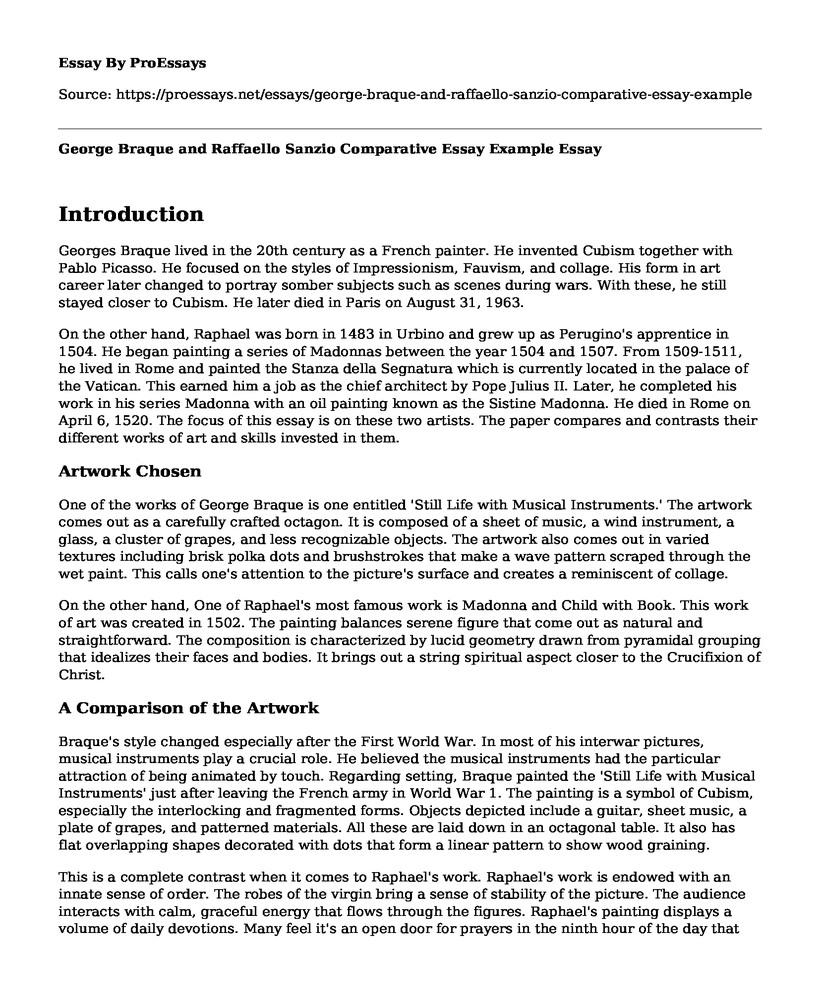Introduction
Georges Braque lived in the 20th century as a French painter. He invented Cubism together with Pablo Picasso. He focused on the styles of Impressionism, Fauvism, and collage. His form in art career later changed to portray somber subjects such as scenes during wars. With these, he still stayed closer to Cubism. He later died in Paris on August 31, 1963.
On the other hand, Raphael was born in 1483 in Urbino and grew up as Perugino's apprentice in 1504. He began painting a series of Madonnas between the year 1504 and 1507. From 1509-1511, he lived in Rome and painted the Stanza della Segnatura which is currently located in the palace of the Vatican. This earned him a job as the chief architect by Pope Julius II. Later, he completed his work in his series Madonna with an oil painting known as the Sistine Madonna. He died in Rome on April 6, 1520. The focus of this essay is on these two artists. The paper compares and contrasts their different works of art and skills invested in them.
Artwork Chosen
One of the works of George Braque is one entitled 'Still Life with Musical Instruments.' The artwork comes out as a carefully crafted octagon. It is composed of a sheet of music, a wind instrument, a glass, a cluster of grapes, and less recognizable objects. The artwork also comes out in varied textures including brisk polka dots and brushstrokes that make a wave pattern scraped through the wet paint. This calls one's attention to the picture's surface and creates a reminiscent of collage.
On the other hand, One of Raphael's most famous work is Madonna and Child with Book. This work of art was created in 1502. The painting balances serene figure that come out as natural and straightforward. The composition is characterized by lucid geometry drawn from pyramidal grouping that idealizes their faces and bodies. It brings out a string spiritual aspect closer to the Crucifixion of Christ.
A Comparison of the Artwork
Braque's style changed especially after the First World War. In most of his interwar pictures, musical instruments play a crucial role. He believed the musical instruments had the particular attraction of being animated by touch. Regarding setting, Braque painted the 'Still Life with Musical Instruments' just after leaving the French army in World War 1. The painting is a symbol of Cubism, especially the interlocking and fragmented forms. Objects depicted include a guitar, sheet music, a plate of grapes, and patterned materials. All these are laid down in an octagonal table. It also has flat overlapping shapes decorated with dots that form a linear pattern to show wood graining.
This is a complete contrast when it comes to Raphael's work. Raphael's work is endowed with an innate sense of order. The robes of the virgin bring a sense of stability of the picture. The audience interacts with calm, graceful energy that flows through the figures. Raphael's painting displays a volume of daily devotions. Many feel it's an open door for prayers in the ninth hour of the day that makes you meditate on the Crucifixion and the death of Christ. His setting dates back to all the was held dearest during the Renaissance- harmony, grace, and nobility of the spirit. In other words, Raphael's painting shows a sense of ability to adapt to new styles and creation of amazing pictures.
Braque's style of pasting paper or other materials onto the canvas represents the essential artifice of employing flat surface to show three-dimensional objects. He liked working on several paintings at the same time but made sure they come out brilliant and meticulous. In his works, he experiments with the visual properties of form and space.
As opposed to Braque's, Raphael's blue arch body of Madonna's silhouette covers the figure of the Child and frames the book. The emphasis is on the hands that hold it. The Nones in the book's inscription symbolizes Christ's Crucifixion and Death. The Christ Child contemplates his sacrifice as man's redeemer. It thus stands out as a meditation piece that profoundly achieves a spiritual quality. Therefore, he stands out as one who is a genius for making all elements of a composition harmonious and meaningful.
Conclusion
The two artists display several amazing skills. They all paint with a sense of humor that touches much on the spirituality of human beings. The two artists show different ways of adopting new styles in painting. This explains why each of their works is in demand. While Raphael appeals to those who want meditation, Braque disapproves people that even after going temporarily blind, he can produce an excellent piece. The two paintings differ in their style and symbolism they bear. Young artists could borrow a lot, like having the sense to adapt to the new style, as a way to climb the ladder of recognition in the art world.
References
Madonna and Child Enthroned with Saints - by Raphael. (2018). Retrieved from http://www.raphaelpaintings.org/madonna-and-child-with-the-book.jsp
Madonna and Child with Book >> Norton Simon Museum. (2018). Retrieved from https://www.nortonsimon.org/art/detail/
Still Life with Musical Instruments >> Norton Simon Museum. (2018). Retrieved from https://www.nortonsimon.org/art/detail/
Still Life with Musical Instruments - Georges Braque - The Athenaeum. (2018). Retrieved from http://www.the-athenaeum.org/art/detail.php?ID=30800
Cite this page
George Braque and Raffaello Sanzio Comparative Essay Example. (2022, Oct 23). Retrieved from https://proessays.net/essays/george-braque-and-raffaello-sanzio-comparative-essay-example
If you are the original author of this essay and no longer wish to have it published on the ProEssays website, please click below to request its removal:
- Media and the Fashion World
- Essay Sample on Barack Obama's Speech A Perfect Nation: Addressing Race & Pastors
- Influence of Self-Esteem, Personality on Social Media Interaction - Essay Sample
- Paper Example on The Lords of Dogtown: Revolutionizing Skate & Surf in West California
- Essay Example on a Prolonged and Tiring Day: My Thoughts on Writing
- Paper Example on Public Speaking: Improving My Social & Persuasive Skills
- Essay Example on Discovering Minimalism: Examining Life's Important Things







